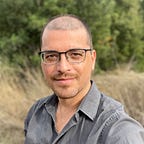Soften, Brother.
Last Sunday I pulled into the parking lot of Congregation Beit Israel, the local synagogue in Northampton, Massachusetts USA. I found a parking spot in the full lot and walked towards the entrance. No one was there, either in the lot or at the entrance. I was fifteen minutes late and I assumed everyone was already inside. It was a brisk day and I was wearing my blue Patagonia down coat, jeans and boots. I took a mindful breath and walked slowly inside.
I followed an invitation on social media to attend an evening that was organized by rabbi Riqi Kosovske — a vigil in solidarity with the victims and survivors of the San Diego Synagogue shooting in which one woman died and four others were wounded. Invoked also were the recent Christian-targeted bombing in Sri Lanka, and at the New Zealand Mosques, both earlier this year. Last time I attended the synagogue six months ago, it was for a similar vigil held after the shooting in Pittsburgh Tree of Life.
From across the corridor I saw the usher standing at the entrance to the great prayer hall. She was standing with her right shoulder turned towards me looking into the room’s front. She’d turn her face two-three times as I approached, making eye contact. I softened and invoked a smile. Nervousness said ‘Why you checking me out? Just trust me. I am trust worthy.’
I reached where the usher stood, nodded, and entered the hall, filled with the congregation. There were mostly adults and elders. On the outside row I spotted a seat next to Dr. Mohammad Bajwa, of the Islamic Society of Western Massachusetts.
As Rabbi Justin David and Rabbi Kosovske led in prayer, I surveyed the room.
I recognized my being younger than most.
I remembered I identify as, and present, a cis-gendered male appearance.
I recalled my caucasian-white skin.
In my imagination, I placed myself as the usher woman at the door.
And felt fear.
I would have feared me.
Remembering the stories of the ushers from the Pittsburgh synagogue, the usher from the mosque in Christchurch — had I been greeting arrivals where she were, seeing this man walking towards me slowly (mindfully!) down the corridor, I could have mistaken me for the next white young-adult shooter. Is that an assault rifle hidden in his coat? Is he entering a place of worship to wage vengeance?
Appreciating the community around me, I took a long breath. I thought of the young black man experiencing homelessness I hung out with the other day, telling me how feared he feels, first for being a man, then as black man, then as a young black man, then as a very large young black man.
I thought of the young Muslim Afghan refugee that I met in Greece four years ago and who is still stranded status-less in a fenced camp, and who shares with me over Facebook messenger the life of desperation, violence, hopeless he leads with other young men in the camp. Back in 2016, I was there by the white fence when his family was processed into an immigration facility, only he was left out to himself. He, and other young men. The other day he sent me a clip of a wedding dance the men in his town performed in a circle, holding ceremonial wooden staffs.
Have I too internalized fear towards young men? I see my annoyance with their arrogance, the way they driving, their sexualizing of things, their incapacity for intimacy, to emote. ‘Their -’, not mine. I am of course ‘better than that.’ Long time ago, that had been one of the reasons’ I chose to live away from Israel, my country of birth. The masculine militaristic culture, the hard edges. I even had an M-16 when I served in the IDF, the prototype for the AR-15 semi-automatic rifle used in some of these attacks. Heck, I was a pretty good shot. In hindsight, now, I learned much from those edges, and appreciate the resilience and grit in the men (and the women, others on spectrum) of ‘my people.’ But when I left, there was an unconscious belief that I simply was better than those men.
My being better than them, I felt separate. Thinking that way protected me, and also made me feel very alone and suspicious, particularly of my brothers, and of myself — I am such brother, to others.
As a collective humanity around the planet, do we protect from and close our hearts to this section of our global community? I imagine a dark purple cloud representing all the young men currently across the planet — the dark purple is the sense of alienation, fear, the wish to nurture and be nurtured, to love, the outrage, the yearning — Them — the fathers of the next sevens generations, the next fathers of my species. I am one of them. Don’t fear me. Please.
Back at the vigil, Dr. Mohammad Bajwa, member of the Mosque in West Springfield next to whom I was seated, spoke up about the San Diego shooter. “What made this boy this way?” He asked with deep empathy. This Muslim elder man, in this synagogue, today, was not afraid. Dr. Bajra had a grounded softness to him.
From the silence, a niggun began. The room sang.
Other times may not call for softness, they may call for a different kind of man to come through me, maybe strong, resolute, decisive. I will stand firm, respectfully, if the moment requires. That’s all good.
But for all the other times, when I see and interact with young men, may I remind myself in kindness and say within, “Soften, Brother.”
